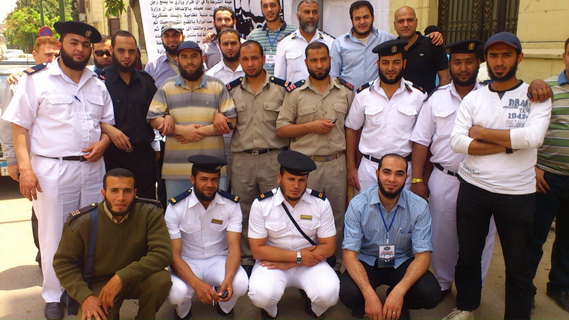CAIRO: The majority of Egyptians are against receiving aid from the United States, according to a recent poll, which highlights increasing calls for transparency regarding the army budget, namely since it receives $1.3 billion annually in aid from the US.
The Gallup poll was released Monday, just as a number of NGOs came under fire from Egypt’s government, accusing them of illegally receiving foreign funding. US officials have in turn criticized the crackdown and floated threats about possibly withholding aid from Egypt.
As the country seeks to boost its battered economy, while youth call for transparent economic policies to battle corruption, the resentment of support from the US may pose a challenge for Egypt’s newly-elected parliament and future president.
Egypt’s dependence on aid from the US is now also coupled with requests to the International Monetary Fund for a $3.2 billion financial support package as it seeks to plug a gaping deficit and dwindling foreign reserves.
Depleting at a rate of $2 billion a month since the uprising that ousted Hosni Mubarak, Egypt’s net foreign reserves reached a little more than $16 billion at the end of January.
In the meantime, Egyptians and youth activists are questioning the army’s budget and its discrete business ventures, which range from hotels, gas stations to factories — and some have even launched a campaign to boycott army products and services.
According to the Gallup poll, about 74 percent of Egyptians oppose the US sending direct aid to Egyptian civil society groups and 71 percent oppose the idea of American aid to Egypt altogether.
Only 26 percent agreed to receive aid from the US, while 20 percent favored receiving aid for civil society organizations.
According to the Gallup report, President Barack Obama plans to speed up aid to Egypt and Congress has already approved $1.3 billion in military aid and $250 million in economic aid for the current fiscal year. Said aid, however, is now in question as many of the members of the NGOs facing a legal battle are American.
“Some of the conditions attached to this aid, including that it may not be spent unless Egypt meets all obligations under the 1979 Israel-Egypt peace treaty, may help explain its unpopularity in certain Egyptian circles. Some Egyptian activists say such restrictions encroach upon Egypt’s sovereignty,” the survey stated.
Undeniably, this been the main concern of Egypt’s youth.
“This money has stipulations. We can never go against what the US wants because we are obliged to follow, we are indebted to them by any kind of aid we receive, whether it is military aid or economic support,” Abdeltawab Hassan, a socialist activist and law student, told Daily News Egypt.
“When you are taking money from a country that supports a Zionist nation, you are working directly towards their interests, not the interests of your own people, who are obviously against this aid,” Abdeltawab added.
As the military-led government continues to investigate NGOs for “illegally” acquiring foreign funds, they have drawn attention to their own obscure, and still taboo, financial portfolio. In Egypt, the military’s finances and how it spends foreign aid continue to be a red line.
“That is why we are calling for the army to reveal their budget. They are trying to show the Egyptian people that the revolutionaries and activists are ruining the economy and are working for outside forces when they are the ones accepting money that we know nothing about,” said Mahienour El-Massry, a lawyer and activist in Alexandria’s No Military Trials campaign.
Many Egyptians, share the same sentiment, believing that the state, especially the Supreme Council of the Armed Forces (SCAF) in its year-old political role, should be more transparent, adhering to the same guidelines that they ask of these organizations.
On the other hand, Ali Zakaria, managing director of the Egyptian Democratic Academy, said, “We can’t criticize this aid when the wheat we use to make our bread is purchased with the money we receive from the US.”
More acceptable aid
The Gallup poll also revealed that Egyptians are more likely to accept aid from international institutions such as the IMF, for example. About 50 percent of Egyptians who were surveyed favored the idea, while 42 percent were opposed.
An even larger percentage was in favor of receiving aid from Arab governments, as 68 percent polled said they approved, while only 28 percent opposed.
Fayza Aboul Naga, minister of planning and international cooperation, “recently noted that her country had received only $500 million of the $3.7 billion promised by Saudi Arabia and $500 million of the $1.5 billion pledged by Qatar. Further, she said the United Arab Emirates has paid none of its promised $3 billion,” the Gallup report stated.
Even the amount initially agreed upon with the IMF — the same package was rejected in June 2011 — now seems to be insufficient to meet Egypt’s financial needs.
In December, Aboul Naga estimated Egypt’s foreign debt to be at $34.4 billion, representing 15 percent of the country’s gross domestic product (GDP), the Gallup report said.
But regardless of how Egyptians feel about aid, some experts see little or no alternatives given the current economic climate.
“Financial aid can in some cases provide badly needed capital for economic empowerment and development, and ultimately help boost foreign investment and trade.
“With financial support from the US deeply unpopular among the Egyptian people, the country’s political and business leaders may be forced to focus on other aid sources. International organizations will play a significant role in the process of helping Egypt marshal resources and expertise for development in a way that the Egyptian public supports at this crucial stage in the country’s transition,” the Gallup report said.
Souring relations
Although the army was first welcomed when they appeared on the streets of Egypt during the January 25 uprising, relations have soured with activists since. With the new parliament in place, several MPs have blamed the sluggish economy on SCAF’s mismanagement of the prolonged transition period, as have some investors and economists.
“Many of our chants during the 18 days of the uprising were against US or any other country’s interference in our political affairs. Economic aid given from government to government has stipulations, they buy their silence through this aid as well as through other indirect means, such as close-knit business ventures,” El-Massry, said referring to America’s relationship with Egypt’s military council.
The military-led government has recently indicted 19 Americans for their work in organizations such as Freedom House and the National Democratic Institute, accusing them of illegally acquiring funds for their work, which includes training political parties, as well as helping new parties form.
“The military is also funded by the US, yet we have no budget report that shows us exactly how this aid is spent, even if the military is keeping this information classified for security reasons, as they like to say, they should at least share parts of this information with the parliament,” Zakaria said.
While Zakaria believes the move to scrutinize these civil society groups is a move by the government to show local media that they are seeking national sovereignty, he added that the military is trying to crush civil society groups.

